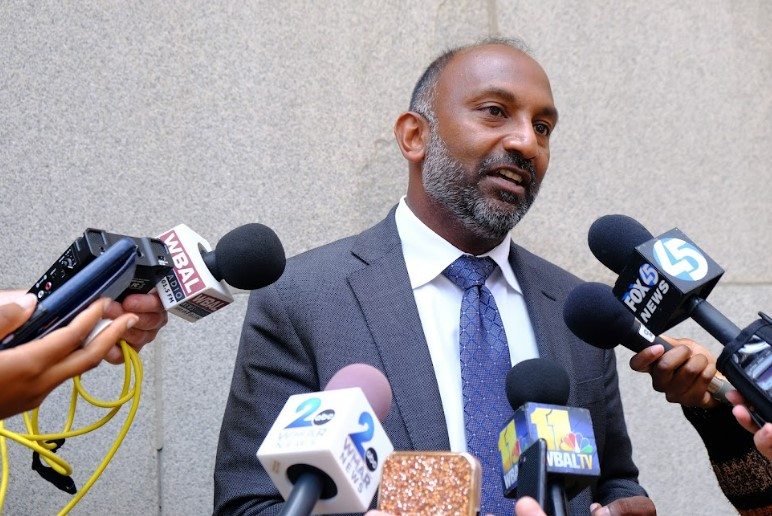By Tashi McQueen,
AFRO Political Writer,
tmcqueen@afro.com
And
Khira Moore,
AFRO Intern
July 25 marked day two of deliberations for the case of the State vs. Tavon Scott Jr., the 16-year old former squeegee worker charged with the July 2022 murder of Timothy Reynolds, a 48-year old man.
Over the past two days the jury has deliberated for nearly eight hours.
“The family is having a hard time,” said Thiru Vignarajah, the Reynolds family attorney. “The family has waited a long time for justice and will have to wait a little longer.”
After an hour of deliberation post-lunch recess, the jury sent notes to the judge that were addressed in courtroom 600 of the Clarence M. Mitchell Jr. Courthouse, a different courtroom from the one the trial has been held in throughout the trial.
“The jury expressed a difficulty in coming to a unanimous decision,” said Gordon.
The prosecution and defense deliberated on how to respond, but the judge ultimately decided on an “Allen charge,” which encouraged the jury to continue deliberation until reaching a unanimous decision, according to Gordon.
The prosecutor, Cynthia Banks, also deemed it “too early” for a mistrial.
“Your response must be unanimous. Each of you must decide the case for yourself,” Schiffer told the jury. “Do not hesitate to give your opinion. Do not relent because of others opinions or to reach a verdict.”
The prosecution and defense spoke with the media about their reactions to the talk of a mistrial.
“A hung jury, you know we can deal with that,” said Warren Brown, Scott’s secondary defense attorney. “It gives us a chance to regroup and try this case again, which would probably be sometime next year.”
“It might be just one person that needs to be convinced. And then it may be six,” said Brown. “We’ll see tomorrow what the jury does.”
Brown also shared that there could be a verdict on some charges and not on others.
Scott is being accused of four charges: first-degree murder, illegal firearm use, handgun on a person and possession of a firearm as a minor.
According to the Merriam-Webster Law Dictionary, first-degree is “a murder that is committed with premeditation or during a serious felony – such as kidnapping – or that otherwise requires the most serious punishment under the law.” There are two types of first-degree murder: felony murder and premeditated murder.
Felony murder falls into effect when the defendant commits a felony that unintentionally results in a murder. Premeditated murder is planned and intentional.
Allegedly, Scott possessed the firearm used to kill Reynolds at the scene. In Maryland, the law generally prohibits minors from possessing firearms. If convicted of any of these previously listed charges, Scott will face a hefty amount of jail time.
Gordon expected that there would be either a verdict or a mistrial today, but his speculation was wrong.
The Scott family, members of the public and reporters waited past 5 p.m., usually the end of deliberation, for a possible verdict but were met with the news of continued deliberation set for tomorrow morning, July 26.
Vignarajah said the family hopes for a verdict in this particular case but will follow through with any further cases that may need to occur.
“Factually and legally, this is a complex case,” said Vignarajah.
Tashi McQueen is a Report For America Corps Member.
The post Day two of deliberations in ex-squeegee worker murder trial brings talk of mistrial appeared first on AFRO American Newspapers .












